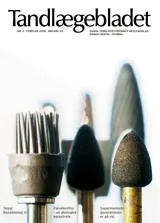Tanden som sensor i tuggfunktionen
Denna översiktsartikel sammanfattar vad vi vet om de sinnesorgan, periodontalreceptorer, som ansvarar för att sända information till hjärnan om de krafter som träffar våra tänder. Oralfysiologisk forskning som utförts på människa visar att periodontalreceptorerna signalerar mycket detaljerad information om position, riktning och intensitet på tugg- och bitkrafter. Denna information används av hjärnan för att reglera käkens motorik under normal funktion. Patienter med implantat, som saknar denna information, uppvisar tydliga störningar i käkens finmotoriska reglering. Genom att öka kunskapen om hjärnans reglering av normala orala funktioner läggs grunden för en fortsatt biologisk utveckling inom oral rehabilitering. Forskningen möjliggör en utveckling av nya diagnostiska hjälpmedel som kan hjälpa klinikern att välja rätt protetisk terapi för att återskapa bästa möjliga orala funktion.
The tooth as a sensor in the masticatory system: Teeth are equipped with periodontal mechanoreceptors that signal information to the brain about tooth loads. In this review, the functional properties of human periodontal receptors are presented along with a discussion about their likely functional role in the control of human mastication. Microneurographic recordings from single nerve fibers in the inferior alveolar nerve reveal that human periodontal receptors adapt slowly to maintained tooth loads. Populations of periodontal receptors encode information about which teeth are loaded and the direction of forces applied to individual teeth. Most receptors exhibit a markedly curved relationship between discharge rate and force amplitude, featuring the highest sensitivity to changes in tooth load at very low force levels. Accordingly, periodontal receptors efficiently encode tooth load when subjects contact and gently manipulate food by the teeth. In contrast, only a minority of the receptors encodes the rapid and strong force increase generated when biting and chewing on food. It is demonstrated that periodontal receptors are particularly important for the control of jaw actions associated with intraoral manipulation of food. Thus, patients that lack information from periodontal receptors show an impaired fine motor control of the mandible.


